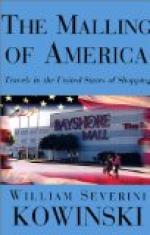The manner of living I have been describing is that of people in moderate circumstances; but this taste for relishes with coffee and tea extends to all ranks of people in these states. Soon after my arrival at this city, I went on a party of pleasure to a sort of tea-garden and tavern[Footnote: By the word tavern, in America, is meant an inn or public house of any description.], romantically situate on the bank of the Scuylkill. At six in the evening we ordered coffee, which I was informed they were here famous for serving in style. I took a memorandum of what was on the table; viz. coffee, cheese, sweet cakes, hung beef, sugar, pickled salmon, butter, crackers, ham, cream, and bread. The ladies all declared, it was a most charming relish!
Yours sincerely, &c.
* * * * *
Philadelphia, March 12th, 1794.
Dear Friend,
The price of labour in this country is very great, owing to the prospect an industrious man has of procuring an independance by cultivating a tract of the waste lands; many millions of acres of which are how on sale by government; to say nothing of those held by individuals. The money arising from the sale of the former is appropriated to the discharge of the national debt.
During my residence in Jersey, I was at no little pains to inform myself of the difficulties attending a back settler. We will suppose a person making such an attempt to possess one hundred pounds, though many have been successful with a much less sum: his first care is to purchase about three hundred acres of land, which, if it is in a remote western settlement, he will procure for about nineteen pounds sterling: he may know the quality of the land by the trees, with which it is entirely covered. The hickory and the walnut are an infallible sign of a rich, and every species of fir, of a barren, sandy, and unprofitable soil. When his land is properly registered, his next care is to provide himself with a horse, a plough, and other implements of agriculture; a rifle, a fowling piece, some ammunition, and a large dog of the blood-hound breed, to hunt deer. We will suppose him arrived at the place of his destination in spring, as soon as the ground is clear of frost. No sooner is the arrival of a new settler circulated, than, for many miles round, his neighbours flock to him: they all assist in erecting his hut; this is done with logs; a bricklayer is only wanting to make his chimney and oven. He then clears a few acres by cutting down the large trees about four feet from the ground[Footnote: These stumps are many years rotting, and, when completely rotted, afford an excellent manure.], grubs up the underwood, splits some of the large timber for railing fences, and sets fire to the rest upon the spot; ploughs round the stumps of the large timber, and in May plants maize, or indian corn. In October he has a harvest




